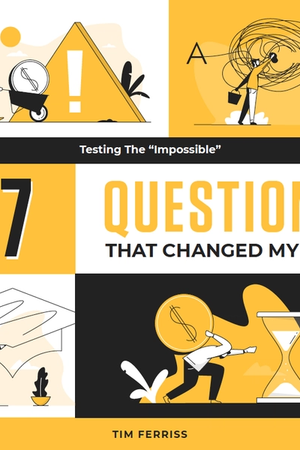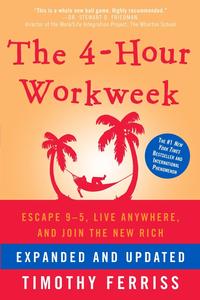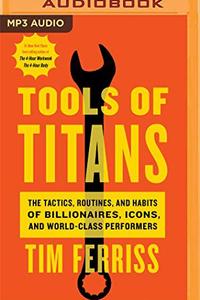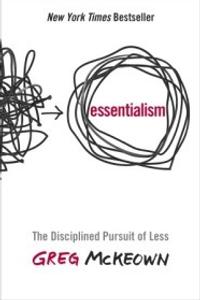
17 Questions That Changed My Life by Tim Ferriss: Summary & Notes
by Tim Ferriss
In One Sentence
The quality of your life depends on the quality of your questions—these 17 questions help cut through fear, clarify priorities, and unlock unconventional paths.
Key Takeaways
- "What would this look like if it were easy?" - question hidden assumptions about difficulty
- "What if I did the opposite?" - contrarian thinking often reveals opportunities
- "What is the worst that could happen?" - fear-setting makes risks manageable
- "Am I hunting antelope or field mice?" - focus on high-impact activities
- "What would I do if I wasn't afraid?" - identify fear-driven avoidance
- Good questions trump good answers—they reframe problems productively
Summary
Tim has always been good at asking the right questions, and this short PDF packs a lot of punch.
These are a staple of my daily journaling practice.
Who Should Read This Book
- Anyone feeling stuck who needs new perspectives
- Tim Ferriss fans looking for his core thinking tools
- People who want to question their assumptions
- Entrepreneurs and creatives seeking clarity
FAQ
What are Tim Ferriss's most important questions?
Key questions include: "What would this look like if it were easy?" "What if I did the opposite?" "What would I do if I couldn't fail?" "What am I avoiding?" "Am I hunting antelope or field mice?" These questions cut through assumptions and fear to reveal better paths.
📖 Chapter-by-Chapter Breakdown
Click to expand the full detailed notes for every chapter →
📖 Chapter-by-Chapter Breakdown
Click to expand the full detailed notes for every chapter →
Questions
The 17 questions:
- What if I did the opposite for 48 hours?
- What do I spend a silly amount of money on? How might I scratch my own itch?
- What would I do/have/be if I had $10 million? What's my real TMI?
- What are the worst things that could happen? Could I get back here?
- If I could only work 2 hours per week on my business, what would I do?
- "What 20% of the customers/products/regions are producing 80% of the profit?"
- "What factors or shared characteristics might account for this?"
- What if I let them make decisions up to $100? $500? $1000?
- What's the least crowded channel?
- What if I couldn't pitch my product directly?
- What if I created my own real-world MBA?
- Do I need to make it back the way I lost it?
- What if I could only subtract to solve problems?
- "What should I put on my not-to-do list?"
- What might I put in place to allow me to go off the grid for 4 to 8 weeks, with no phone or email?
- Am I hunting antelope or field mice?
- Which one of these, if done, would render all the rest either easier or completely irrelevant?
- Could it be that everything is fine and complete as it is?
- What would this look like if it were easy?
- How can I throw money at this problem? How can I "waste" money to improve the quality of my life?
- No hurry, no pause
Detailed Notes
Reality is largely negotiable.
If you stress-test the boundaries and experiment with the "impossibles," you'll quickly discover that most limitations are a fragile collection of socially reinforced rules you can choose to break at any time.
What if I did the opposite for 48 hours?
What do I spend a silly amount of money on? How might I scratch my own itch?
Before everyone got fired, I begged my coworkers to each prepay for a bottle, which gave me enough money to hire chemists, a regulatory consultant, and do a tiny manufacturing run. I was off to the races.
What would I do/have/be if I had $10 million? What's my real TMI?
What are the worst things that could happen? Could I get back here?
If I could only work 2 hours per week on my business, what would I do?
After reading The E-Myth Revisited by Michael Gerber and The 80/20 Principle by Riichard Koch, I decided that extreme questions were the forcing function I needed.
"What 20% of the customers/products/regions are producing 80% of the profit?"
"What factors or shared characteristics might account for this?"
What if I let them make decisions up to $100? $500? $1000?
This question allowed me to take my customer service workload from 40-to-60 hours per week to less than 2 hours per week.
This experience underscored two things for me:
- To get huge, good things done, you need to be okay with letting the small, bad things happen, and
- People's IQs seem to double as soon as you give them responsibility and indicate you trust them.
What's the least crowded channel?
What if I couldn't pitch my product directly?
People don't like being sold products, but we all like being told stories. Work on the latter.
What if I created my own real-world MBA?
Do I need to make it back the way I lost it?
Humans are very vulnerable to a cognitive bias called "anchoring," whether in real estate, stocks, or otherwise. Good investors recommend Think Twice by Michael Maboussin.
What if I could only subtract to solve problems?
"What should I put on my not-to-do list?"
What might I put in place to allow me to go off the grid for 4 to 8 weeks, with no phone or email?
Four to eight weeks (or more) doesn’t allow you to be a firefighter. It forces you to put systems and policies in place, ditch ad-hoc email-based triage, empower other people with rules and tools, separate the critical few from the trivial many, and otherwise create a machine that doesn’t require you to be behind the driver’s wheel 24/7. (Page 14)
Here’s the most important point: The systems far outlive the vacation, and when you come home, you’ll realize that you’ve taken your business (and life) to the next level. This is only possible if you work on your business instead of in your business, as Michael Gerber might say (Page 14)
Am I hunting antelope or field mice?
"Which one of these, if done, would render all the rest either easier or completely irrelevant?"
Could it be that everything is fine and complete as it is?
Aim to cultivate more daily appreciation and present-state awareness.
Think of daily wins before bed.
What would this look like if it were easy?
If I feel stressed, stretched thin, or overwhelmed, it's usually because I'm overcomplicating something or failing to take the simple/easy path because I feel I should be trying "harder."
How can I throw money at this problem? How can I "waste" money to improve the quality of my life?
"If you've got enough money to solve the problem, you don't have the problem."—Dan Sullivan, Strategic Coach
In the beginning of your career, you spend time to earn money. Once you hit your stride in any capacity, you should spend money to earn time, as the latter is nonrenewable.
No hurry, no pause
This isn't a question—it's a fundamental reset.
You don't need to strain yourself through life; you can get 95% of the results you want by calmly moving ahead.
Similar: "Slow is smooth. Smooth is fast."



